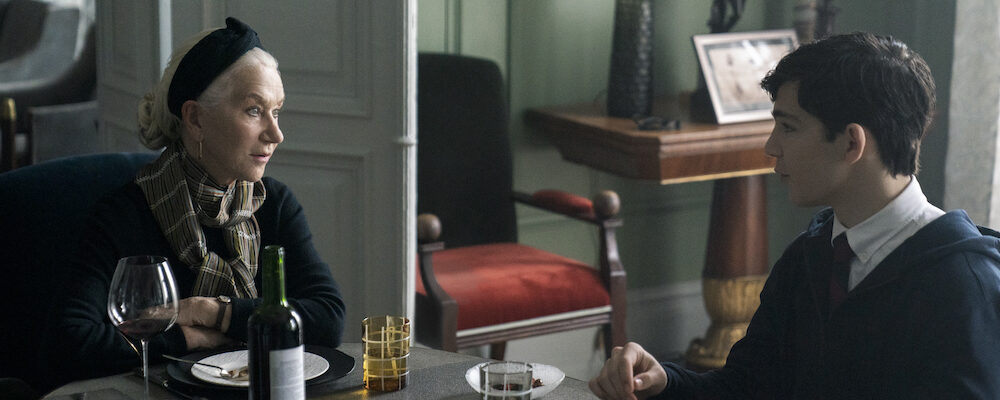‘White Bird’ Tells a Compelling Story of Friendship and Love in WWII France
Alci Rengifo
Young adult stories tend to focus on the perils of young romance. It makes sense considering how powerful everything feels in adolescence. Marc Forster’s “White Bird” is about two young people falling in love, but tells its story with a welcoming subtlety. The real subject of this film is survival in dark times. “White Bird” is based on a graphic novel by R.J. Palacio, who is best known for “Wonder,” which was made into a film starring Julia Roberts in 2017. For the young people in this story, school and growing up come with classic hassles which are then enhanced by living during World War II.
The narrative of “White Bird” is both a prequel and sequel to “Wonder.” Julian Albans (Bryce Gheisar), one of the boys who bullied Auggie, the kid with mandibulofacial dysostosis in the previous story, is now a high schooler adjusting to life at a new private school. He was expelled already from another institution for bullying. Now he is the outsider, getting picked on by other jerks and shy around a girl he meets who runs the social justice club. When Julian’s grandmother, Sara (Helen Mirren), drops in for a visit, she notices his sense of alienation. He announces he is going to just be “normal” without caring about being mean or nice. Sara decides to tell him her own, previously unshared backstory of growing up in Alsace, France. We go back in time to 1942 and see a young Sara (Ariella Glaser) and her parents, Rose (Olivia Ross) and Max Blum (Ishai Golan), endure as Jews while France is ruled by Nazi puppet government, the Vichy regime.
Forster gracefully directs “White Bird” with an engaging style that brings out the heart of this story. Some may find a few of its developments a bit contrived, as is the norm with many young adult movies. One has to approach this film by what it is doing with the genre. Cinematographer Matthias Koenigswieser lights Sara’s village like the kind of rustic place that could easily inspire fairy tales. At school, Sara crushes on a popular boy, Vincent (Jem Matthews), sketching him in her notebook of impressive drawings. There are bullies, of course, who make fun of Julien Beaumier (Orlando Schwerdt), a student with a leg affected by polio. Julien is also a projectionist at a local cinema, where the films of Charles Chaplin feel like a welcome escape from a changing world. For a brief spell the Blums believe they might be safe from all the stories coming in of Nazi persecution of Jews. After all, Alsace sits outside of the official occupation zone and they are upper middle class professionals.
The narrative then uses the story of the war to strip down Sara’s young illusions and sense of safety. Antisemitism becomes more prominent as the occupying regime forms local militias. Vincent unsurprisingly becomes a fascist. When Sara is separated from her parents during roundups of Jews at school, she can only find safety in a barn belonging to the family of Julien. This is where “White Bird” becomes a young romance with a deeper resonance. As Sara and Julien spend time together in the barn, their blossoming affection is the result of necessary solidarity. Without people like Julien and his parents, Vivienne (Gillian Anderson) and Jean Paul (Jo Stone-Fewings), those that are threatened by prejudices or extermination have less chance of survival. “White Bird” is also a tale of bravery as the resistance takes shape around town, with partisans hiding out in the local movie theater.
Mixed with scenes of genuine terror, as Vichy troops hunt for Jews or Vincent and his buddies carry out fascist violence, are expected moments that get corny. Yet, can you have a YA romance without some silliness? It is irresistibly endearing when Sara pretends to drive a car in the barn with Julien as her passenger, describing the streets of Paris, which he has never seen. You want to clap when she rips out of her journal the sketch of that jerk Vincent, who turned out to be Nazi scum. Forster isn’t using the Holocaust as popcorn entertainment though. This film generates a sense of fear, outrage and memory. In an important, universal sense, it reminds its target audience that kindness is a radical gesture when society has gone insane. This is important to note now when terms like occupation, war, ethnic cleansing and discrimination are sadly dominating headlines.
There remain a few areas that could have been expanded further in this story. You can never get enough of Gillian Anderson, who is endearing as Julien’s mother, but she gets so few scenes. Helen Mirren is also essentially a glorified cameo, but a strong one because it is Helen Mirren, and her character’s young life. Still, “White Bird” is a moving film, which refuses to easily resolve its love story and is unafraid of genuine, terrible moments of heartbreak. Conflict and terror can turn even the most picturesque French village into a survival zone where a good neighbor might be the last best hope. Palacio’s book is primarily aimed at middle school readers, though you sense a lot of adults will find much in this story that resonates on a universal level.
“White Bird” releases Oct. 4 in theaters nationwide.

